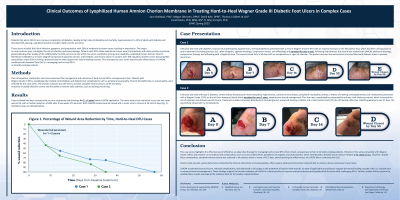Case Series/Study
(CS-148) Clinical Outcomes of Lyophilized Human Amnion Chorion Membrane in Treating Hard-to-heal Wagner Grade III diabetic Foot Ulcers in Complex Cases
Friday, May 2, 2025
7:45 PM - 8:45 PM East Coast USA Time

Carol Devlin, PhD, MSN, RN – MIMEDX Group Inc.; Megan Oltmann, DPM; David Kyle, DPM; Allyn Forsyth, PhD – MIMEDX Group Inc.
Introduction: Chronic diabetic foot ulcers (DFUs), especially hard-to-heal wounds, present significant challenges in patients with multiple chronic conditions and complex medication regimens. These patients often face delayed healing, increased risk of infection, and complications, necessitating a comprehensive, individualized treatment approach. This objective of this case series is to assess the outcomes of advanced wound care strategies, including Living Human Amniotic Cell Membrane (LHACM) as an adjunct to Standard of Care (SOC) in the treatment of hard-to-heal Wagner Grade 3 DFUs in patients with multiple chronic conditions and complex medication regimens who were unresponsive to conventional treatments.
Methods: Two male patients, aged 65 and 66, with hard-to-heal Wagner Grade III DFUs that had failed to close with prior treatments and dressings before the application of LHACM for one to three years. Both patients had complex medical histories and were on multiple medications. Both wounds were treated with debridement, antimicrobial or moisture-retentive dressings, and LHACM. Offloading strategies were employed to reduce pressure on the ulcer site. The wounds were regularly assessed and treated over multiple visits, with significant progress observed in both cases.
Results: both wounds demonstrated significant size reduction within three weeks of treatment, achieving complete closure within a mean of 45.5 days (35 and 56 days). No infection recurrences or complications were observed, and patients resumed daily activities.
Discussion: This case series highlights the effectiveness of advanced wound care strategies, including LHACM in combination with customized wound care strategies, including debridement, offloading, and dressings, in the management of hard-to-heal DFUs in patients with multiple chronic conditions and complex medication regimens. Further large-scale studies are warranted to confirm these findings and explore broader applications in advanced wound care.
Methods: Two male patients, aged 65 and 66, with hard-to-heal Wagner Grade III DFUs that had failed to close with prior treatments and dressings before the application of LHACM for one to three years. Both patients had complex medical histories and were on multiple medications. Both wounds were treated with debridement, antimicrobial or moisture-retentive dressings, and LHACM. Offloading strategies were employed to reduce pressure on the ulcer site. The wounds were regularly assessed and treated over multiple visits, with significant progress observed in both cases.
Results: both wounds demonstrated significant size reduction within three weeks of treatment, achieving complete closure within a mean of 45.5 days (35 and 56 days). No infection recurrences or complications were observed, and patients resumed daily activities.
Discussion: This case series highlights the effectiveness of advanced wound care strategies, including LHACM in combination with customized wound care strategies, including debridement, offloading, and dressings, in the management of hard-to-heal DFUs in patients with multiple chronic conditions and complex medication regimens. Further large-scale studies are warranted to confirm these findings and explore broader applications in advanced wound care.

.jpg)